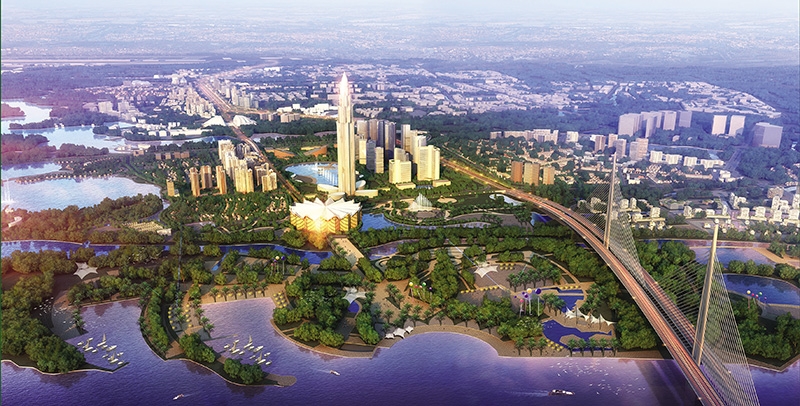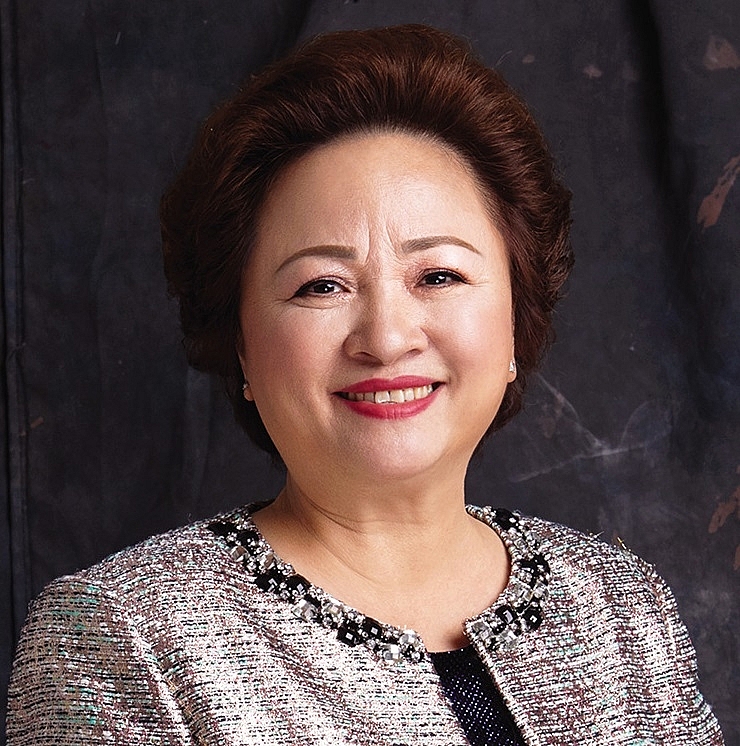
Through a 50/50 joint venture, a whopping 270 hectares of land located some 20 minutes from the city will begin development early next year and is expected to be complete by 2028.
The smart city will be state of the art in that it will employ Industry 4.0 technology such as the Internet of Things to ensure energy is conserved. It will also feature surveillance cameras that come with the capabilities to recognise faces together with AI.
Reality a long-term vision
Marking the first milestone of the North Hanoi Smart City Project just before the 65th anniversary of Hanoi’s Liberation on October 10, Nguyen Thi Nga, chairwoman of BRG Group said, “We build a smart city not for our generation, but for many Vietnamese generations of the future. Here, the capacity of Vietnamese people will be truly activated and maximised, thereby creating momentum to promote the country’s socio-economic development.”
Ten years ago, the businesswoman proposed to invest in a project on the two sides of the Nhat Tan-Noi Bai route. In May 2009, BRG Group was assigned the task. Since then, Nga and her partners have embarked on a journey of numerous challenges to realise the dream of a Hanoi for future Vietnamese generations.
“I still remember when the international planning contractor required a topographic survey for the entire 2,080 hectares, and to know the location of houses, temples, roads, or schools. Engaging in finance, I can see clearly the cost, not to mention challenges of time and its feasibility. But we still had to do it anyway,” she said.
She could also never forget the sheer number of meetings with government and Hanoian authorities, besides overnight discussions with international consultants. “Sometimes the ideas of foreign architectural planners and management agencies were not unified, and work needed considering so many times. I felt tired and very lonely with almost no-one understanding or accompanying me, while I also needed to take care of the group’s other issues,” Nga said.
However, with a great love for Hanoi and the desire to give people a new quality environment, Nga and BRG Group have now reached the next stage. In December 2015, under the authorisation of the Prime Minister, Hanoi officially approved the planning map.
After completing the detailed plan, BRG Group has continuously sought partners. It required devoted partners and sharing of a mutual vision for sustainable development. The goal was to create a city of new vitality, bringing modern and classy living standards, and creating motivation for socio-economic development for the country.
Sumitomo Corporation, one of Japan’s leading firms, ultimately officially shook hands with BRG Group to develop the smart city venture.
Hanoian heart and spirit
Masayuki Hyodo, president and CEO of Sumitomo, said at the groundbreaking ceremony of the project that he “really admires the vision and passion” of the BRG Group leader.
“Her love for the country and for Hanoi is an inspiration,” Hyodo said.
“This project does not copy the model of any city, but is a beautiful scheme with the latest 4.0 technologies, bringing together a new quality of life for people,” Hyodo emphasised.
Located on the main route linking Hanoi city centre with Noi Bai International Airport, the smart city project is considered to be a bridge to speed up commercial trade co-operation between Vietnam and other countries in the region and around the world.
According to the plan for the BRG-Sumitomo joint venture, people will enjoy the maximum benefits from comprehensive development of modern and sustainable infrastructure, thereby accelerating the process of socio-economic development in the capital city.
The smart city venture will apply many advanced technologies across areas such as smart energy, smart mobility, smart governance, smart learning, smart economy and smart living. A smart building management system and renewable energy technology will also be prioritised to optimise energy supply and storage.
In parallel with the smart city design, it is expected that the joint venture will also build a detailed plan on the application of 5G technology, face recognition, and blockchain.
Developing smart cities will not only support Hanoi to solve existing problems in, for instance, transport infrastructure, healthcare, education, energy, and inadequacies in urban management and planning; but it will also activate new growth engines for the country, soon realising the resolutions on Industry 4.0 that the Politburo has just promulgated, which focuses on the target of at least three smart cities in three key economic regions across the country by 2025.
As a pioneering investor in such a project, which challenges have you faced?

This is not only a great but also an unprecedented project in Vietnam. Everything is quite new and strange, so we have to do the research and test many times before outlining the final plan. I myself had to stroll around various traditional villages in the north to survey and search for a suitable solution to meet the requirements of a modern smart city within a traditional village via green natural living spaces. Seeking suitable partners to implement the project is also a big challenge. It is lucky that we met Sumitomo Corporation, one of the very few experts in implementing a smart city model successfully.
We are still facing a lot of challenges but we have received great support and encourage from the governments of Japan and Vietnam as well as local related agencies and authorities when starting the project. We understand that what we are doing is not only an ordinary infrastructure project but also the first foundation for the development of a modern Hanoi which can be comparable to advanced cities across the world.
What are the specialties that we can expect for this Hanoi Smart City project?
The smart city is Vietnam’s gateway to the world, the first images and impressions of the country, and its modern and cultured people. This will also be the ideal venue to exchange commercial and trading services between Vietnam and other countries. The traditional, historical, cultural, and natural beauties of Dong Anh district will be highlighted in harmony with Internet of Things technologies.
Some of my favourite architectures include the Pearl Lake situated in the heart of the smart city, inspired from the immortal Hoan Kiem Lake; and the 108-storey financial tower in the shape of a beautiful lotus that will be a financial centre for Hanoi and the Southeast Asian region. We will also have a cultural park which honours the most outstanding cultural identities of ASEAN member states and a square where residents can come to entertain and celebrate festivities after work.
When can the first residents live in the smart city?
The smart city is divided into five phases of construction closely connected and synchronised with each other. This is a great project that requires a thorough and meticulous research process to meet top quality standards. The first phase is expected to be completed 24 months from the date that North Hanoi Smart City Development Investment JSC, the name of the joint venture between BRG and Sumitomo, is handed over the cleared premises.
We have a plan and a specific roadmap for each phase of the project. I also look forward to living in “the new Hanoi”.


















